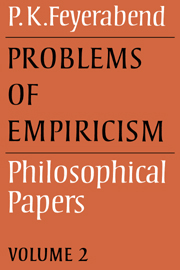Book contents
- Frontmatter
- Contents
- Introduction to volumes 1 and 2
- 1 Historical background
- 2 Classical empiricism
- 3 The structure of science
- 4 Two models of epistemic change
- 5 Philosophy of science versus scientific practice
- 6 Mach, Einstein and the Popperians
- 7 Wittgenstein's Philosophical Investigations
- 8 Consolations for the specialist
- 9 Popper's Objective Knowledge
- 10 The methodology of scientific research programmes
- 11 More clothes from the emperor's bargain basement
- Sources
- Name Index
- Subject Index
8 - Consolations for the specialist
Published online by Cambridge University Press: 05 June 2012
- Frontmatter
- Contents
- Introduction to volumes 1 and 2
- 1 Historical background
- 2 Classical empiricism
- 3 The structure of science
- 4 Two models of epistemic change
- 5 Philosophy of science versus scientific practice
- 6 Mach, Einstein and the Popperians
- 7 Wittgenstein's Philosophical Investigations
- 8 Consolations for the specialist
- 9 Popper's Objective Knowledge
- 10 The methodology of scientific research programmes
- 11 More clothes from the emperor's bargain basement
- Sources
- Name Index
- Subject Index
Summary
‘I have been hanging people for years, but I have never had all this fuss before.’ (Remark made by Edward ‘Lofty’ Milton, Rhodesia's part time executioner on the occasion of demonstrations against the death penalty.) ‘He was’ – says Time magazine (15 March 1968) – ‘professionally incapable of understanding the commotion’.
INTRODUCTION
In the years 1960 and 1961 when Kuhn was a member of the philosophy department at the University of California in Berkeley I had the good fortune of being able to discuss with him various aspects of science. I have profited enormously from these discussions and I have looked at science in a new way ever since. Yet while I thought I recognized Kuhn's problems; and while I tried to account for certain aspects of science to which he had drawn attention (the omnipresence of anomalies is one example); I was quite unable to agree with the theory of science which he himself proposed; and I was even less prepared to accept the general ideology which I thought formed the background of his thinking. This ideology, so it seemed to me, could only give comfort to the most narrowminded and the most conceited kind of specialism. It would tend to inhibit the advancement of knowledge. And it is bound to increase the anti-humanitarian tendencies which are such a disquieting feature of much of post-Newtonian science (cf. ch. 2). On all these points my discussions with Kuhn remained inconclusive.
- Type
- Chapter
- Information
- Problems of EmpiricismPhilosophical Papers, pp. 131 - 167Publisher: Cambridge University PressPrint publication year: 1981
- 5
- Cited by

